Brexit: Does NI tariffs plan violate WTO law?
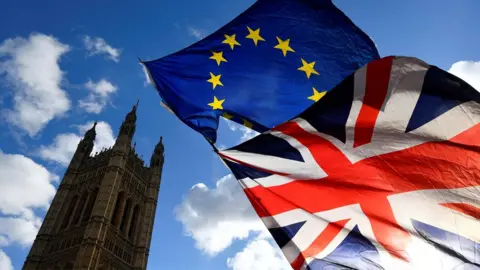 Reuters
ReutersThe UK government's strategy for the Irish border if there's a no deal Brexit will mean no tariffs on Irish goods going to Northern Ireland, but some Irish food products entering Great Britain will face high tariffs.
Under the plan, the UK also won't impose any physical checks or controls on the border, but is it legal?
The government is understood to be confident that the arrangement won't conflict with World Trade Organization (WTO) rules, but some trade experts have expressed scepticism at the proposal.
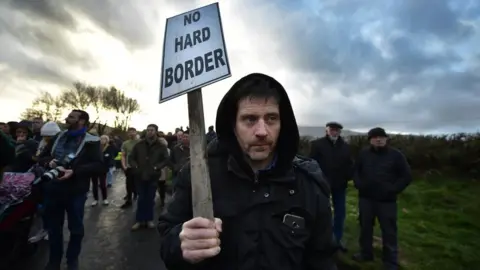 Getty Images
Getty ImagesWhy is there a no-deal border plan?
Let's go back to basics.
After Brexit, the border that separates Northern Ireland from the Republic of Ireland will also be the UK's only land border with the EU and both countries could be in different customs and regulatory regimes, which could mean products being checked at the border.
Under the deal which has been debated in Parliament, the government said the way to mitigate that was the backstop: the insurance policy to maintain an open border in the absence of anything else.
Read more about what the backstop is here.
Now, with fewer than 20 days until the UK is due to leave the EU and with no deal still the default option, the government has set out its own idea to keep the border seamless in a no-deal outcome.
It will not impose tariffs, which are taxes on trade, on goods coming from producers in the Republic of Ireland into Northern Ireland.
But goods going from the Republic of Ireland into the rest of the UK would face high tariffs on a range of food products.
Because of that differential treatment of trade, questions have been raised that the plan may not comply with WTO laws.
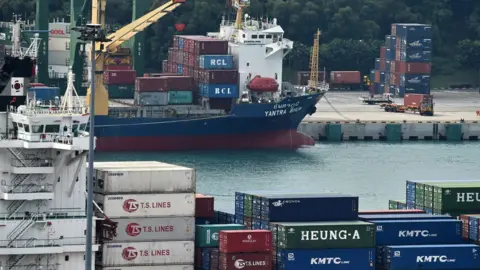 Getty Images
Getty ImagesWhat are WTO rules?
They are the most basic set of rules for trade, which the UK would be trading on with other countries if it leaves the EU without a deal.
They mean tariffs on some goods, particularly food and agriculture, and much higher barriers to trade compared to the EU single market.
Under these rules, the most important principle is members do not discriminate, so if zero tariffs are applied to one member they should be applied to all members.
At a glance, the UK government's "unique arrangement" for Northern Ireland would appear to conflict with that.
What do trade experts make of the plan?
Some of them take issue with the government's belief that the arrangement would not violate WTO rules.
Senior counsel at law firm Linklaters, Lorand Bartels, said the plan raised the question of whether the UK could apply different tariffs at different borders.
If the answer to that is negative then the UK would need to justify its differential tariffs, he added.
It's understood the government has looked at what is known as the 'public morals' exemption.
Dr Bartels is sceptical about that: "It is hard to see how this could be justified on the basis of public morals, but other exceptions might work."
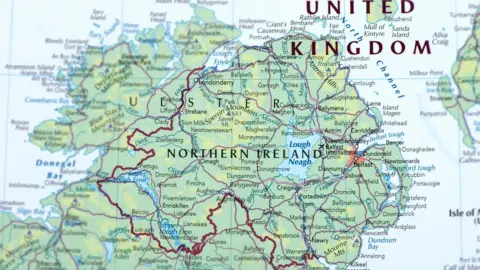 Getty Images
Getty ImagesFormer WTO negotiator Dmitry Grozoubinski argued that while the proposal was "probably not" compliant with WTO rules, the organisation could not force the UK to change its policy.
There were two subsequent issues with this, he said.
Even if other WTO members believe they are being disadvantaged by the rules and complain to the WTO, the lengthy disputes process means it would take "many years" before it could allow other members to impose reciprocal tariffs on UK exports.
If a complaint was made, the UK would then be "obliged" to consult with the other country over a 60-day period to try to resolve their differences.
He added that only after that 60-day period could they even begin the process of launching what's called a "WTO dispute", which takes a year to come to a conclusion.
He argued that if the UK has decided it is comfortable being in breach of the rules, or willing to deal with the consequences, little would change in the immediate aftermath.
Allow X content?
But the UK believes its strategy is compliant?
The government is thought to be confident that the arrangement will not conflict with WTO rules, and could invoke an exemption to the non-discrimination principle.
Holger Hestermeyer, an expert in international dispute resolution at the British Academy, argued that the plan creates an "established concept of a de facto discrimination" because of the differential treatment in trade.
He said it seemed obvious that the Republic of Ireland would be a "larger beneficiary" than other countries by having zero tariffs on goods going into Northern Ireland.
But his conclusion was that the more significant problem with the policy would be factual. "What happens if you tell traders 'either you pay tariffs - or you go through Northern Ireland'," he said.
Elvire Fabry, senior research fellow at the Jacques Delors Institute, in charge of trade policy, globalisation and Brexit suggested that the UK could argue for a WTO exemption in the form of Article XXI: national security.
It prevents any member from taking action against another state in order to maintain international peace and security.
She said as it was a "grey zone", given the history of violence at the border in Northern Ireland, it could be considered by WTO members.
Has the WTO said anything about the plan?
No.
A WTO spokesperson said it would not be appropriate to speculate at a time when the situation was so fluid.
And as some trade experts argue, with the various WTO dispute mechanisms a country would have to go through before a determination, it could be resolved before ever reaching a critical level.
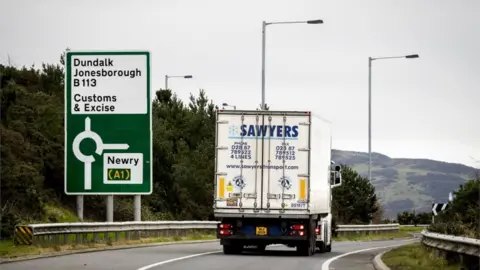 PA
PADoes that resolve the border issue in a no-deal scenario then?
Not quite.
Although this is what the UK has said it will do if there's no deal, it cannot speak to what the Republic of Ireland, and by extension the EU, would do.
The British government has said the measures would be "strictly temporary" and that its priority would be to enter into discussions urgently with the European Commission and the Irish government to jointly agree long-term measures to avoid a hard border.
The Irish government has so far not said how it would manage its side of the border, but has also reiterated that it was committed to ensuring no hardening of it.
It has said it will respond collectively to the tariff proposals "as part of the EU27".
The EU says it will "carefully analyse" the compliance of the UK's plan with WTO law and that it would want to protect the viability of its market by "accordingly charging tariffs on imports from the UK into the EU".
Already the questions raised by the complexities of this proposal and criticism of it from business and farming groups on the island of Ireland, about the impact it could have on their competitiveness, mean the border issue is far from resolved.
